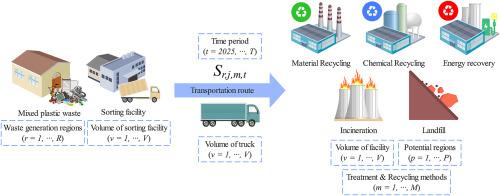Advanced modeling of plastic recycling supply chain networks for emission reduction and sustainability
IF 10
1区 环境科学与生态学
Q1 ENGINEERING, ENVIRONMENTAL
引用次数: 0
Abstract
Plastic products are rising in demand due to their beneficial properties, increasing plastic waste emissions. Historically, China imported plastic waste; however, stringent bans after 2018 have shifted the burden to producing countries like Korea. International agreements such as the United Nations Framework Convention on Climate Change, Kyoto Protocol, Paris Agreement, and Intergovernmental Panel on Climate Change guidelines emphasize greenhouse gas emission reduction. By 2030, Korea aims to cut emissions by over 35% and achieve a plastic waste recycling rate of 70%. Limited land area necessitates sustainable waste management beyond landfills and incineration. Effective management can reduce environmental impact and generate carbon credits. Thus, this study constructs an optimal supply chain network for recycling plastic waste in Korea using a multi-period model based on the Organization for Economic Co-operation and Development statistics. The model integrates collection, sorting, transportation, and recycling, focusing on material recycling, chemical recycling, and energy recovery. It addresses Korea's waste management challenges while targeting national emission reduction and recycling rate goals. Expected outcomes include optimal recycling strategies, policy recommendations, and industry practices to implement this supply chain network, contributing to Korea's environmental goals and global efforts to mitigate plastic waste impacts. The proposed model provides a scalable, adaptable framework for sustainable waste management globally.


面向减排和可持续发展的塑料回收供应链网络高级建模
塑料制品由于其有益的特性,需求不断上升,增加了塑料废物的排放。历史上,中国进口塑料垃圾;然而,2018年之后的严厉禁令将负担转移到了韩国等生产国。《联合国气候变化框架公约》、《京都议定书》、《巴黎协定》、政府间气候变化专门委员会(ipcc)等国际协议都强调减少温室气体排放。到2030年,韩国的目标是减少35%以上的排放量,实现70%的塑料废物回收率。有限的土地面积需要可持续的废物管理,而不是填埋和焚烧。有效的管理可以减少对环境的影响并产生碳信用额。因此,本研究使用基于经济合作与发展组织统计数据的多时期模型构建了韩国塑料废物回收的最佳供应链网络。该模式集收集、分类、运输、回收为一体,以物料回收、化学品回收、能源回收为重点。它解决了韩国的废物管理挑战,同时瞄准了国家减排和回收率目标。预期结果包括最佳回收战略、政策建议和行业实践,以实施这一供应链网络,为韩国的环境目标和全球减轻塑料废物影响的努力做出贡献。拟议的模式为全球可持续废物管理提供了一个可扩展的、适应性强的框架。
本文章由计算机程序翻译,如有差异,请以英文原文为准。
求助全文
约1分钟内获得全文
求助全文
来源期刊

Journal of Cleaner Production
环境科学-工程:环境
CiteScore
20.40
自引率
9.00%
发文量
4720
审稿时长
111 days
期刊介绍:
The Journal of Cleaner Production is an international, transdisciplinary journal that addresses and discusses theoretical and practical Cleaner Production, Environmental, and Sustainability issues. It aims to help societies become more sustainable by focusing on the concept of 'Cleaner Production', which aims at preventing waste production and increasing efficiencies in energy, water, resources, and human capital use. The journal serves as a platform for corporations, governments, education institutions, regions, and societies to engage in discussions and research related to Cleaner Production, environmental, and sustainability practices.
 求助内容:
求助内容: 应助结果提醒方式:
应助结果提醒方式:


